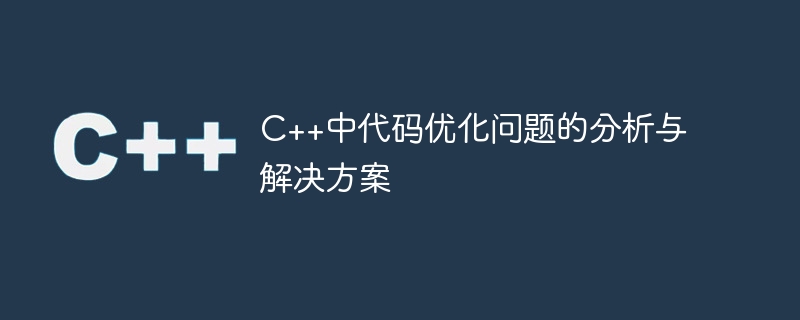

Analysis and solutions to code optimization problems in C
In C programming, code optimization is an important aspect. Optimizing code can make the program execute more efficiently, run faster, and reduce resource usage. This article will explore some common code optimization problems and provide corresponding solutions and specific code examples.
In C, frequent memory allocation and release operations will cause unnecessary overhead. One solution is to use object pooling or memory pooling technology. Object pool refers to allocating a fixed-size memory pool in advance and reusing these memory blocks during program running, instead of allocating and releasing memory every time.
The following is a simple object pool example:
class ObjectPool {
private:
std::vector<Object> pool; // 内存池
std::queue<Object*> freeList; // 空闲列表
public:
Object* getObject() {
if (freeList.empty()) {
Object* newObj = new Object;
pool.push_back(newObj);
return newObj;
} else {
Object* obj = freeList.front();
freeList.pop();
return obj;
}
}
void recycleObject(Object* obj) {
freeList.push(obj);
}
};When you need to use the Object object, you can get the object from the object pool by calling the getObject() method instead of using the new operator. Memory allocation. When the object is no longer needed, you can call the recycleObject() method to put the object back into the object pool instead of using the delete operator to release memory.
In loops, using appropriate loop methods and iterators can improve program execution efficiency. For example, when iterating over an array or container, a range-based for loop should be used in preference to a traditional for loop.
The following is an example of using a range-based for loop to traverse an array:
int arr[] = {1, 2, 3, 4, 5};
// 传统for循环
for (int i = 0; i < sizeof(arr) / sizeof(arr[0]); ++i) {
std::cout << arr[i] << " ";
}
// 范围基于的for循环
for (int val : arr) {
std::cout << val << " ";
}The range-based for loop is more concise, more efficient for traversing arrays and containers, and reduces index calculations and access.
Inline functions are an optimization technology that can embed the function code directly into the calling site, avoiding the overhead of function calls. In some simple short functions, using inline functions can improve the execution efficiency of the program.
The following is an example of using an inline function:
inline int add(int a, int b) {
return a + b;
}
int result = add(3, 4);When calling the add function, the compiler will embed the code of the function directly into the call site instead of generating instructions for the function call.
In C, object construction and copying operations may consume a lot of time and resources. When writing code, unnecessary object copying and construction should be avoided to improve program execution efficiency.
The following are some examples to avoid unnecessary copying and construction:
Summary:
Code optimization is very important in C programming. By avoiding frequent memory allocation and release, using more efficient loops, rationally using inline functions, and avoiding unnecessary copies and construction, the execution efficiency and running speed of the program can be improved. The solutions and specific code examples introduced above can be used as a reference for optimizing code and help achieve more efficient C programs.
The above is the detailed content of Analysis and solutions to code optimization problems in C++. For more information, please follow other related articles on the PHP Chinese website!




